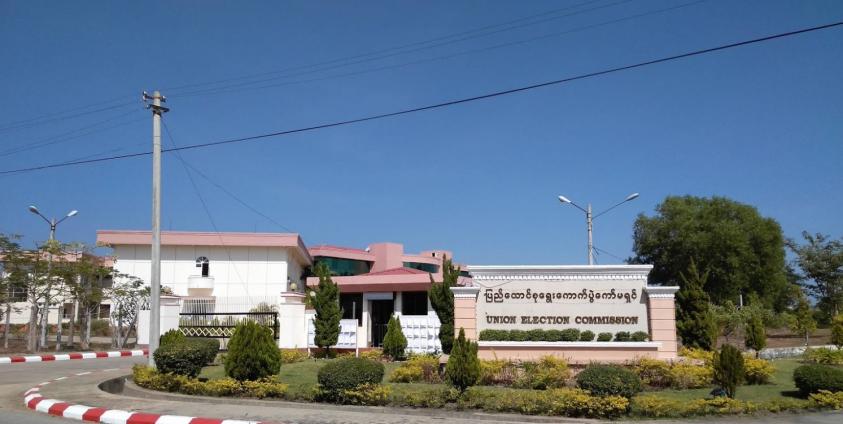According to Myanmar political analysts, the Military Council has been consistently granting permits for political party registration. However, the crucial announcement of the election date is still pending, which prevents political parties from being fully operational or activated.
Within a span of over a month from April 20th to the first week of June, the Union Election Commission (UEC), an entity under the influence of the Military Council, permitted the registration of 22 political parties.
On June 5th, the People's Pioneer Party (PPP) led by Daw Thet Thet Khaing, the Minister of Social Welfare and Resettlement under the Military Council, along with the Danu National Democracy Party (DNDP), were officially recognized and granted political party registration.
Nevertheless, political analysts express criticism, highlighting that under the dominance of the Military Council, political parties are likely to face limitations in their rights to political collaboration, decision-making, and effective operation.
According to U Than Soe Naing, a political analyst, the issuance of party registration permits by the Military Council is overshadowed by the persisting military conflict, rendering it impossible for any party to engage in campaigning activities.
"Amidst the ravages of war, Sagaing Region stands as a poignant symbol. The fear-stricken populace dares not venture beyond the Kaunghmudaw Pagoda in Sagaing Township. In the vast expanse of other Regions and mountainous terrains, the flames of conflict rage unabated, rendering all political campaigns futile. Even the Union Solidarity and Development Party (USDP) finds itself paralyzed, unable to orchestrate any meaningful activities. While parties may be permitted to register, their impotence is evident. Moreover, the Military Council's dominion has shrunk, relinquishing control over 60 percent of the nation's territory. As the armed strife escalates relentlessly, the Military Council's ability to declare a definitive election date has become an elusive endeavor”, he remarked.
Based on the political party registration law enacted by the Military Council, political parties intending to campaign at the Region or State level must meet certain criteria. Firstly, within 90 days of registration, these parties are required to gather a minimum of 1000 party members. Additionally, after 180 days, these parties should be capable of establishing party offices in at least 5 townships.
U Aung Khin, the chairman of the Shan-ni Solidarity Party (SSP) told Than Lwin Times that his party has completed the registration process as a political party approximately a month ago, however, has not commenced any activities thus far.
"As of now, we find ourselves in a state of inaction. Our first priority is to organize a party conference. Adhering to the regulations, the task of establishing party offices in 5 townships poses a formidable challenge for us. Specifically, in areas such as Banmauk, Tamu, and Paungbyin, where the Shan community resides, we encounter numerous obstacles. These regions face significant limitations and difficulties. Only Homalin and Hkamti can be considered comparatively stable and peaceful”, he said.
In accordance with the law enacted by the Military Council, SSP registered as a political party with the purpose of engaging in campaign activities within the Sagaing Region.
However, Sagaing Region, known for its strong revolutionary stance and vehement opposition to the coup, presents significant challenges in terms of ensuring the safety and security of political parties. Conducting campaigns within this region is inherently difficult due to the unpredictable circumstances and potential risks involved.
Khun Tun Shwe, the Co-Secretary 2 of the Pa-O National Organization (PNO), acknowledges that while their party has obtained registration permission to campaign in Shan State, their current focus is primarily on bolstering the party's membership. At present, they are unable to actively engage in other party activities beyond this objective.
"As a party, we are operating within the boundaries set by the UEC. Presently, our main emphasis lies in enhancing the party's strength, and we have not been able to address other pressing matters at this time”, he told Than Lwin Times.
The Military Council staged a coup, claiming that there were widespread vote frauds in the 2020 election. They pledged to organize new elections as a resolution. However, implementing this promise has proven challenging due to the robust opposition to the coup that has emerged throughout the country.
According to political analysts, there is growing concern that the Military Council, under the leadership of Senior General Min Aung Hlaing, is more inclined to retain power rather than fulfill their promise of holding elections in the current situation.
In late January, the Military Council enacted the political party registration law for the upcoming election. As per the law, each party is required to apply for registration with the UEC within a 60-day period.
Prior to the deadline, 63 parties submitted their registration applications, while 40 parties were automatically dissolved as they failed to complete the registration process within the specified timeframe.







